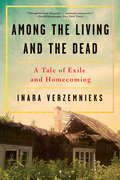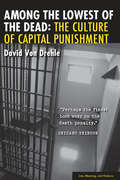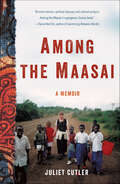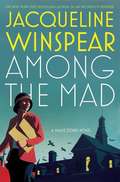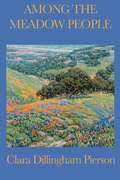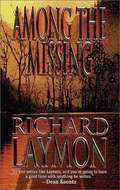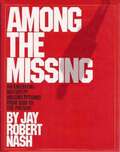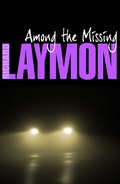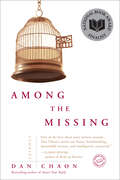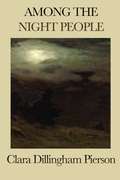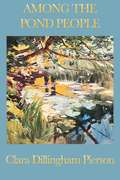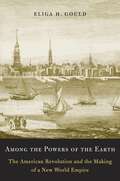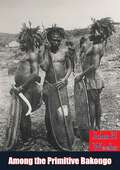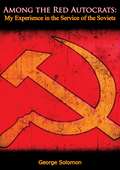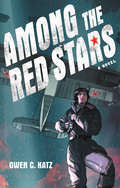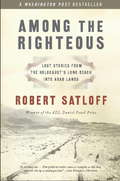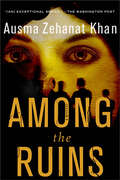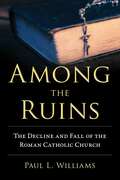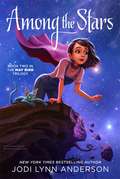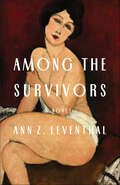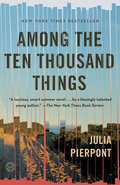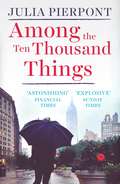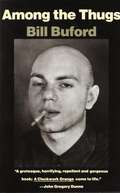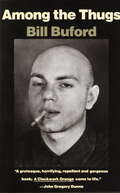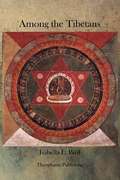- Table View
- List View
Among the Living and the Dead: A Tale Of Exile And Homecoming On The War Roads Of Europe
by Inara Verzemnieks“Extraordinarily tender and finely wrought.” — Eliza Griswold, author of The Tenth Parallel “It’s long been assumed of the region where my grandmother was born…that at some point each year the dead will come home,” Inara Verzemnieks writes in this exquisite story of war, exile, and reconnection. Her grandmother’s stories recalled one true home: the family farm left behind in Latvia, where, during WWII, her grandmother Livija and her grandmother’s sister, Ausma, were separated. They would not see each other again for more than 50 years. Raised by her grandparents in Washington State, Inara grew up among expatriates, scattering smuggled Latvian sand over the coffins of the dead, singing folk songs about a land she had never visited. When Inara discovers the scarf Livija wore when she left home, in a box of her grandmother’s belongings, this tangible remnant of the past points the way back to the remote village where her family broke apart. There it is said the suspend their exile once a year for a pilgrimage through forests and fields to the homes they left behind. Coming to know Ausma and the trauma of her exile to Siberia under Stalin, Inara pieces together Livija’s survival through years as a refugee. Weaving these two parts of the family story together in spellbinding, lyrical prose, she gives us a profound and cathartic account of loss, survival, resilience, and love.
Among the Lowest of the Dead
by David Von DrehleFrom the cavernous halls of justice to the desolate cells on death row, from the brutal crimes of the convicted to the unbearable anguish of the victims, prizewinning journalist David Von Drehle takes us, as never before, into the harrowing world of the ultimate punishment. Here are the lawyers, on both sides, who dedicate their lives to saving or ending the lives of the accused. Here are the judges who pass the sentences and the politicians who pass the buck. And here are the inmates, staring at their walls and looking death in the face. A work of profound insight and stark vision, AMONG THE LOWEST OF THE DEAD sheds a revelatory light on this deepest, darkest realm. Acclaimed as one of the most powerful books ever written about crime and punishment in America, it is certain to shock both you . . . and the system.
Among the Maasai: A Memoir
by Juliet CutlerIn 1999, Juliet Cutler leaves the United States to teach at the first school for Maasai girls in East Africa. Captivated by the stories of young Maasai women determined to get an education in the midst of a culture caught between the past and the future, she seeks to empower and support her students as they struggle to define their own fates. Cutler soon learns that behind their shy smiles and timid facades, her Maasai students are much stronger than they appear. For them, adolescence requires navigating a risky world of forced marriages, rape, and genital cutting, all in the midst of a culture grappling with globalization. In the face of these challenges, these young women believe education offers hope, and so, against all odds, they set off alone―traveling hundreds of miles and even forsaking their families―simply to go to school. Twenty years of involvement with this school and its students reveal to Cutler the important impacts of education across time, as well as the challenges inherent in tackling issues of human rights and extreme poverty across vastly different cultures. Working alongside local educators, Cutler emerges transformed by the community she finds in Tanzania and by witnessing the life-changing impact of education on her students. Proceeds from the sale of this book support education for at-risk Maasai girls.
Among the Mad (Maisie Dobbs #6)
by Jacqueline WinspearIn the thrilling new novel by the New York Times bestselling author of An Incomplete Revenge, Maisie Dobbs must catch a madman before he commits murder on an unimaginable scale. It's Christmas Eve 1931, on the way to see a client, Maisie Dobbs witnesses a man commit suicide on a busy London street. The following day, the prime minister's office receives a letter threatening a massive loss of life if certain demands are not met and the writer mentions Maisie by name. After being questioned and cleared by Detective Chief Superintendent Robert MacFarlane of Scotland Yard's elite Special Branch, she is drawn into MacFarlane's personal fiefdom as a special adviser on the case. Meanwhile, Billy Beale, Maisie's trusted assistant, is once again facing tragedy as his wife, who has never recovered from the death of their young daughter, slips further into melancholia's abyss. Soon Maisie becomes involved in a race against time to find a man who proves he has the knowledge and will to inflict death and destruction on thousands of innocent people. And before this harrowing case is over, Maisie must navigate a darkness not encountered since she was a nurse in wards filled with shell-shocked men. In Among the Mad, Jacqueline Winspear combines a heart-stopping story with a rich evocation of a fascinating period to create her most compelling and satisfying novel yet.
Among the Meadow People
by Clara Dillingham PiersonAmong the Meadow People includes twenty-eight charming tales about the everyday life of the meadow creatures. The tales are told in such a manner that they seem realistic, and are not only entertaining, but educational.
Among the Missing
by Richard LaymonAt 2:32 in the morning a Jaguar roars along a lonely road high in the California mountains. Behind the wheel sits a beautiful woman wearing only a skimpy, revealing nightgown. She's left her husband behind. She's after a different kind of man--someone as wild, daring, and passionate as herself. The man she wants is waiting for her... with wild plans of his own. The man waits patiently in the woods. When the woman stops to pick him up, he suggests they go to the Bend, where the river widens and there's a soft, sandy beach. With the stars overhead and moonlight on the water, it's an ideal place for love. But there will be no love tonight. In the morning a naked body will be found at the Bend-- a body missing more than its clothes. And the man will be waiting for someone else.
Among the Missing: An Anecdotal History of Missing Persons from 1800 to the Present
by Jay Robert NashThe endless mystery of Amelia Earhart's last flight. The mysterious disappearance of Judge Joseph Force Crater. The vanishing acts of Agatha Christie, Sherwood Anderson and Aimee Semple McPherson. The lost adventurers - Colonel Percy Fawcett, Richard Halliburton, and George Leigh-Mallory. These famous faces and hundreds more make up this fascinating and fact-filled book. Along with the cases that made national and worldwide headlines, there are the exotic stories of infamous or until now obscure missing persons which read like captivating mystery, adventure, and sometimes science fiction tales. There is the case of New York heiress Dorothy Arnold, who vanished forever while crossing Fifth Avenue during a day of shopping. And David Lang, who according to 5 eyewitnesses, evaporated into thin air on a Tennessee country road in 1880. Then there was Arthur Orton, who insisted until his last breath that he was Roger Charles Tichborne, the scion of one of England's oldest families, whose vast holdings brought him a million dollars a year until he mysteriously disappeared with the ship Bella in 1854. The stories of those who returned from the world of the missing are often the most bizarre. The book contains all the elements of high human drama: love, vengeance, avarice, adventure, mystery, violence, sex, and murder.
Among the Missing: She put her trust in the wrong man…
by Richard LaymonShe thought he was offering her a chance of escape. She was wrong. Richard Laymon's Among the Missing is a riveting horror novel, full of shocking revelations, twists and turns. Perfect for fans of Stephen King and Clive Barker.'Among the Missing is strikingly different. From the chilling opening...we are plunged into a disturbing world of twisted psychopathology' - The TimesAt 2:32 in the morning a Jaguar roars along a lonely road high in the Californian mountains. Behind the wheel sits a beautiful woman wearing only a skimpy, revealing nightgown. She's left her husband behind. She's after a different kind of man - someone as wild, daring and passionate as herself. The man she wants is waiting for her... with wild plans of his own.The man waits patiently in the woods. When the woman stops to pick him up, he suggests they go to the Bend, where the river widens and there's a soft sandy beach. With the stars overhead and moonlight on the water, it's an ideal place for love. But there will be no love tonight. In the morning a naked body will be found at the Bend - a body missing more than its clothes. And the man will be waiting for someone else... What readers are saying about Among the Missing: 'Throw in some dark humour and Laymon's assortment of oddball characters and the book delivers a nice chunk of escapism for a few hours, with some surprising plot twists''Without a doubt one of the most gripping stories he has ever written. A classic story of murder, mayhem, decapitation and double-edged twists [that run] the whole way through''The suspense lurks beneath the surface until the final Hollywood-style ending'
Among the Missing: Stories
by Dan ChaonIn this haunting, bracing new collection, Dan Chaon shares stories of men, women, and children who live far outside the American Dream, while wondering which decision, which path, or which accident brought them to this place. Chaon mines the psychological landscape of his characters to dazzling effect. Each story radiates with sharp humor, mystery, wonder, and startling compassion. Among the Missing lingers in the mind through its subtle grace and power of language.From the Trade Paperback edition.
Among the Night People
by Clara Dillingham PiersonAmong the Night People includes fifteen charming tales about the everyday life of the night creatures. The tales are told in such a manner that they seem realistic, and are not only entertaining, but educational.
Among the Pond People
by Clara Dillingham PiersonAmong the pond people includes eighteen charming tales about the everyday life of the pond creatures. The tales are told in such a manner that they seem realistic, and are not only entertaining, but educational.
Among the Powers of the Earth
by Eliga H. GouldFor most Americans, the Revolution’s main achievement is summed up by the phrase “life, liberty, and the pursuit of happiness. ” Yet far from a straightforward attempt to be free of Old World laws and customs, the American founding was also a bid for inclusion in the community of nations as it existed in 1776. America aspired to diplomatic recognition under international law and the authority to become a colonizing power itself. As Eliga Gould shows in this reappraisal of American history, the Revolution was an international transformation of the first importance. To conform to the public law of Europe’s imperial powers, Americans crafted a union nearly as centralized as the one they had overthrown, endured taxes heavier than any they had faced as British colonists, and remained entangled with European Atlantic empires long after the Revolution ended. No factor weighed more heavily on Americans than the legally plural Atlantic where they hoped to build their empire. Gould follows the region’s transfiguration from a fluid periphery with its own rules and norms to a place where people of all descriptions were expected to abide by the laws of Western Europe-“civilized” laws that precluded neither slavery nor the dispossession of Native Americans.
Among the Primitive Bakongo: and other tribes of equatorial Africa, with a description of ... habits, customs & religious beliefs
by John H WeeksAmong the Primitive Bakongo by John H. Weeks offers a vivid and insightful account of life among the Bakongo people of Central Africa, based on the author’s extensive firsthand experiences as a missionary and ethnographer in the late 19th and early 20th centuries. Weeks provides a detailed exploration of Bakongo culture, traditions, and social structures, capturing the essence of their daily lives, beliefs, and customs.The book delves into various aspects of Bakongo society, from their kinship systems and governance to their religious practices and ceremonies. Weeks pays particular attention to the Bakongo’s spiritual worldview, including their use of fetishes, ancestral worship, and rites surrounding life, death, and healing. Through his careful observations, he illuminates how these traditions shaped the community's identity and cohesion.While grounded in the anthropological curiosity of its time, Among the Primitive Bakongo also reflects the broader context of European interactions with African societies during the colonial period. Though written from the perspective of a Western observer, the work offers valuable historical insights into a rich and complex culture that was undergoing significant change.With its blend of ethnographic detail and narrative storytelling, this book remains a fascinating resource for anyone interested in African history, anthropology, or the interplay between tradition and transformation in a rapidly shifting world.
Among the Red Autocrats: My Experience in the Service of the Soviets
by George Solomon Dr Arno C. GaebeleinFirst published in 1935, this is the full and frank account of author George Solomon’s service to the Soviet Government during the Russian Civil War.Solomon, who was named First Secretary to the Commissar for Commerce and Industry, Leonid Borisovich Krasin, in July 1918, provides a detailed record of his time with the Red Autocrats, beginning with assuming his new position and his first meeting with L. B. Krasin in Germany in July of 1918, being welcomed as an enemy in his native Russia in June 1919, to representing the Commission of Administration to take over all the business transactions in Estonia in August 1920 and, finally, arriving in England in June 1921, before his retirement from service on August 1, 1923.
Among the Red Stars
by Gwen C. KatzA suspenseful historical YA debut inspired by the true story of an all-female bomber unit in Russia during World War II.World War II has erupted in Valka’s homeland of Russia, and Valka is determined to help the effort. She’s a pilot—and a good one—so she eagerly joins an all-female bomber regiment. Flying has always meant freedom and exhilaration for Valka, but dropping bombs on German targets is something else entirely. The raids are dangerous, but as Valka watches her fellow pilots putting everything on the line in the face of treachery, she learns the true meaning of bravery. As the war intensifies, though, and those around her fall, Valka must decide how much she is willing to risk to defend the skies she once called home. Inspired by the true story of a famous all-female Russian bomber regiment, Gwen C. Katz weaves a tale of strength and sacrifice, of learning to fight for yourself, and of the perils of a world at war.
Among the Righteous
by Robert SatloffWas there an Arab Schindler? The neverbefore- told story of the Holocaust in the Arab lands of North Africa, and one man's quest to find the truth
Among the Ruins: A Mystery (Rachel Getty and Esa Khattak Novels)
by Ausma Zehanat Khan“Iran’s stormy history is the atmospheric backdrop for Ausma Zehanat Khan’s Among the Ruins, the third book in her exceptional series featuring Esa Khattak…The story takes on the air of a James Bond movie, including an explosive finale on the Caspian Sea.”—The Washington PostOn leave from Canada’s Community Policing department, Esa Khattak is traveling in Iran, reconnecting with his cultural heritage and seeking peace in the country’s beautiful mosques and gardens. But Khattak’s supposed break from work is cut short when he’s approached by a Canadian government agent in Iran, asking him to look into the death of renowned Canadian-Iranian filmmaker Zahra Sobhani. Zahra was murdered at Iran’s notorious Evin prison, where she’d been seeking the release of a well-known political prisoner. Khattak quickly finds himself embroiled in Iran’s tumultuous politics and under surveillance by the regime, but when the trail leads back to Zahra’s family in Canada, Khattak calls on his partner, Detective Rachel Getty, for help. Rachel uncovers a conspiracy linked to the Shah of Iran and the decades-old murders of a group of Iran’s most famous dissidents. Historic letters, a connection to the Royal Ontario Museum, and a smuggling operation on the Caspian Sea are just some of the threads Rachel and Khattak begin unraveling, while the list of suspects stretches from Tehran to Toronto. But as Khattak gets caught up in the fate of Iran’s political prisoners, Rachel sees through to the heart of the matter: Zahra’s murder may not have been a political crime at all.From Ausma Zehanat Khan, the critically acclaimed author of The Unquiet Dead and The Language of Secrets, comes Among the Ruins, another powerful novel exploring the interplay of politics and religion, and the intensely personal ripple effects of one woman’s murder.
Among the Ruins: The Decline and Fall of the Roman Catholic Church
by Paul L. WilliamsThis critical review of the Roman Catholic Church since the pivotal changes initiated in the 1960s by Vatican II paints a disturbing picture of decline and corruption. Dr. Paul L. Williams, a self-professed Tridentine or traditionalist Catholic, traces the various factors that have caused the Church to suffer cataclysmic losses in all aspects of its life and worship in recent decades. Williams illustrates the decline with telling statistics showing the stark difference between the robust number of clergy members, parishes, schools, and active church-going Catholics in 1965 versus the comparatively paltry number today. The author is highly critical of Popes Paul VI, John Paul II, Benedict XVI, and Francis for steering the church so far away from its traditional teachings and for a lack of oversight that allowed corruption to fester. Symptomatic of this failure of leadership are the recent pedophilia scandals, the ongoing financial corruption, a gay prostitution ring inside the Vatican, and criminal investigations of connections between the Holy See and organized crime. This unflinching critique from a devoted, lifelong Catholic is a wakeup call to all Catholics to restore their church to its former levels of moral leadership and influence.
Among the Stars
by Jodi Lynn AndersonMay Bird has always been a bit. . . different. While most of her classmates were riding their bikes, she was running around the West Virginia woods, dressed as a warrior princess with her hairless cat at her side. And while most of her classmates were spending their summer vacations going to birthday parties, May was discovering a mysterious lake hidden among the trees -- and stumbling into the land of ghosts, the Ever After. A fearful and fantastic realm located among the stars, the Ever After is full of phantoms and poltergeists, ghouls and goblins, and all manner of things that go bump in the night. And if May is to find her way out again, she must reach the mysterious Lady of North Farm, who lives in a cold, forbidding land that even the spooks find spooky. With her courageous (yet melancholy) kitty and a ragtag group of spectral friends she's picked up along the way, May is determined to escape the Afterlife. But her travels will bring her face-to-face with her worst fears: a devious pursuer; a truly horrifying dance party under the sea, hosted by the Bogey (aka Boogie) Man; and the Ever After's terrible ruler, Evil Bo Cleevil. And when all of these things collide, there's no telling who will find courage to make it through. . . or who will be left behind.
Among the Survivors: A Novel
by Ann Z. LeventhalThough twenty-one-year-old Karla Most manages to bag Saxton Perry, a virtual prince thirty years her senior, she has no idea how to live happily ever after, with or without him. Karla cannot get past her anger at having been deceived by her single, now-dead mother, Mutti, who—supposedly a “Holocaust victim,” complete with tattooed numbers—was in fact a German Christian who got into the United States by falsifying her background. So what does that make her daughter? Before she can answer that question, Karla must track down the actual story of her own existence.
Among the Ten Thousand Things
by Julia PierpontFor fans of Jennifer Egan, Jonathan Franzen, Lorrie Moore, and Curtis Sittenfeld, Among the Ten Thousand Things is a dazzling first novel, a portrait of an American family on the cusp of irrevocable change, and a startlingly original story of love and time lost. Jack Shanley is a well-known New York artist, charming and vain, who doesn't mean to plunge his family into crisis. His wife, Deb, gladly left behind a difficult career as a dancer to raise the two children she adores. In the ensuing years, she has mostly avoided coming face-to-face with the weaknesses of the man she married. But then an anonymously sent package arrives in the mail: a cardboard box containing sheaves of printed emails chronicling Jack's secret life. The package is addressed to Deb, but it's delivered into the wrong hands: her children's. With this vertiginous opening begins a debut that is by turns funny, wise, and indescribably moving. As the Shanleys spin apart into separate orbits, leaving New York in an attempt to regain their bearings, fifteen-year-old Simon feels the allure of adult freedoms for the first time, while eleven-year-old Kay wanders precariously into a grown-up world she can't possibly understand. Writing with extraordinary precision, humor, and beauty, Julia Pierpont has crafted a timeless, hugely enjoyable novel about the bonds of family life--their brittleness, and their resilience. Advance praise for Among the Ten Thousand Things "This book is one of the funniest and most emotionally honest I've read in a long time."--Jonathan Safran Foer "Remarkable . . . Pierpont displays not only wisdom, but real tact as a writer, knowing how much to say, how much to leave out, how much to imply."--Colm Tóibín "Every page of this gorgeous novel contains such joys that you won't want to stop reading for anything."--J. Courtney Sullivan "Poignant, surprising, and fiercely intelligent, Among the Ten Thousand Things is about the sturdiness and tremendous delicacy of the bonds between parents and children. Don't miss this powerful debut."--Megan Abbott "A vicious and enchanting portrait of a fragmenting family that will leave you hungry for whatever Julia Pierpont does next."--Courtney Maum "Sharply observed and deeply illuminating, Among the Ten Thousand Things marks the beginning of what is sure to be a brilliant career."--Elliott Holt "Why aren't there more first or second or seventh novels like Among the Ten Thousand Things? That's what I asked myself as I read--actually, devoured--Julia Pierpont's debut. My conclusion: Very few writers, at any point in their lives, can produce prose of the sort you'll find here."--Sean Wilsey "Among the Ten Thousand Things succeeds in being both heartbreaking and funny: It's a wry, sly look at a privileged New York upbringing and the ultimate loneliness at the heart of it."--Mary Gordon "The perennial theme of marital infidelity is given a brisk, insightful, and sophisticated turn in Pierpont's impressive debut. . . . This novel leaves an indelible portrait of lives blown off course."--Publishers Weekly (starred review)"A treat for fans of Jonathan Franzen, Jami Attenberg, and Emma Straub . . . shows off an exciting new voice on the literary landscape."--Library Journal (starred review)From the Hardcover edition.
Among the Ten-Thousand Things: A Novel
by Julia PierpontAmong the Ten-Thousand Things chronicles the breakup of a family in contemporary New York following a devastating extra-marital affair. Jack is a sculptor - charming and vain, visionary and vulnerable in equal measure - whose controversial work wins him attention from a young admirer. When Jack's spurned lover sends his wife Deb a box of their correspondence to their apartment (and after it is accidentally intercepted by their children), Deb takes refuge with nine-year-old Kay and eleven-year-old Simon on Rhode Island where they become embroiled with a local family that hauntingly reflects their own.At once a mordant moral vision of modern family life and an ironic dissection of our self-deceptions, Julia Pierpont's first novel is reminiscent of Jonathan Franzen and Jonathan Dee's blistering portraits of post 9/11 American family life. Brimming with lyricism and emotional intelligence, Among the Ten-Thousand Things is an astonishingly original and sure-footed debut that reflects our world back to us with extraordinary force.
Among the Thugs
by Bill BufordThey have names like Barmy Bernie, Daft Donald, and Steamin' Sammy. They like lager (in huge quantities), the Queen, football clubs (especially Manchester United), and themselves. Their dislike encompasses the rest of the known universe, and England's soccer thugs express it in ways that range from mere vandalism to riots that terrorize entire cities. Now Bill Buford, editor of the prestigious journal Granta, enters this alternate society and records both its savageries and its sinister allure with the social imagination of a George Orwell and the raw personal engagement of a Hunter Thompson.
Among the Thugs
by Bill BufordThey have names like Barmy Bernie, Daft Donald, and Steamin' Sammy. They like lager (in huge quantities), the Queen, football clubs (especially Manchester United), and themselves. Their dislike encompasses the rest of the known universe, and England's soccer thugs express it in ways that range from mere vandalism to riots that terrorize entire cities. <P><P>Now Bill Buford, editor of the prestigious journal Granta, enters this alternate society and records both its savageries and its sinister allure with the social imagination of a George Orwell and the raw personal engagement of a Hunter Thompson.
Among the Tibetans
by Isabella L. BirdAmong the Tibetans is a record of Isabella Bishop's 1889 journey into Ladakh. It is a fascinating account of her encounters with the region's natives and her observations of their lifestyles, as well as an insight into the difficulties of travelling in such areas in the late nineteenth century.
